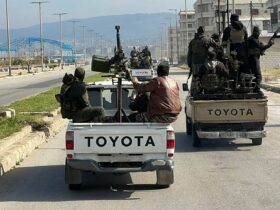On June 16, Pyongyang announced the possibility of introducing military units into the demilitarized zone on the border with South Korea. On the same day, the inter-Korean communications office, established about two years ago on the wave of rapprochement between the South and the North, was destroyed.
The explosion took place on Tuesday in Kesong near the South Korean border, BBC News reported. According to the South Korean Ministry of Unification, the explosion destroyed the office building.
Dramatic video from South Korea's Ministry of National Defense showing North Korea blowing up the liaison office with South Koreahttps://t.co/HIMAMG16uE pic.twitter.com/Vn6CCbG9tZ
— Victoria Kim (@vicjkim) June 16, 2020
Korea Central News Agency (KCNA), the official DPRK news agency, said the office was destroyed by DPRK authorities:
“The relevant field of the DPRK put into practice the measure of completely destroying the north-south joint liaison office in the Kaesong Industrial Zone in the wake of cutting off all the communication liaison lines between the north and the south, corresponding to the mindset of the enraged people to surely force the human scum and those who have sheltered the scum to pay dearly for their crimes”.
Military pressure?
On June 9, North Korea cut all communication lines to Seoul. Shortly before that, Pyongyang had issued a directive to permanently end communication through all channels, including military channels and a special line between the two countries’ senior leadership.
On June 13, Kim Yo Jong, the first deputy department head of the Korean Labor Party Central Committee (KPC), sister of Korean leader Kim Jong-un, said Pyongyang was preparing a response to an insult to the country’s leadership.
“I feel it is high time to definitely break with the southern Korean authorities,” said Kim Yo Jong, a figure many believe to be next in line for the country’s highest leadership position.
DPRK authorities have also warned South Korea about military retaliation in preparation.
On June 16, the General Staff of the Korean People’s Army stated that “the United Front Department of the Party Central Committee and arms of the department in charge of the affairs with the enemy has taken an action plan to take measures to make the army advance again into the zones that have been demilitarized under the north-south agreement, turn the front line into a fortress and further heighten the military vigilance against the south”.
On June 16, Rodong Sinmun – one of the official newspapers of the DPRK – expressed “faith and will of our people to wipe out the human scum and the group of traitors at any cost wherever they are in this world”.
The failure of reconciliation
The escalation of hostility between North and South Korea began in early June. The current round of confrontation was sparked by propaganda leaflets that were launched into the territory of DPRK from South Korea. The leaflets were considered an insult by the DPRK. However, back in May, in the demilitarized zone on the border between North and South Korea, shots were fired between the South Korean military and their North Korean counterparts.
Anti-North Korean agitation is a permanent tool of Seoul and the right-wing parties in South Korea. The fact that the DPRK is reacting so violently may indicate that there are other factors at play.
One of them is the obvious failure of the strategy to reconcile with the United States which Kim Jong-un began implementing in 2018. Despite Kim’s meetings with Donald Trump, the US did not ease the military pressure, refusing to reduce their large-scale military presence in South Korea and to ease sanctions. In response, last year, the DPRK began testing missile reactive systems. The DPRK then increased pressure on the South by encouraging it to abandon its impossible demand to “denuclearize the DPRK”.
On June 13, Kwon Jong Gun, director-general of the Department of US Affairs of the Ministry of Foreign Affairs of the Democratic People’s Republic of Korea, criticized Seoul for its hypocritical demand for “denuclearization”. The day before on the anniversary of the first summit of Kim Jong-un and Donald Trump in Singapore – Ri Son Gwon, Minister of Foreign Affairs of DPRK said that the US had done nothing in response to attempts by the DPRK to reconcile.
“Unless the 70-plus-year deep-rooted hostile policy of the US towards the DPRK is fundamentally terminated, the US will as ever remain a long-term threat to our state, our system and our people,” said the North Korean minister. – The secure strategic goal of the DPRK is to build up a more reliable force to cope with the long-term military threats from the US This is our reply message to the US on the occasion of the second anniversary of June 12″.
The recent report by the Stockholm International Peace Research Institute (SIPRI) also shows that Donald Trump’s initiative to denuclearize DPRK has failed.
The document says that at the beginning of this year, North Korea had 20 more warheads than in January 2019. Pyongyang now has a total of 30 nuclear warheads, according to experts.
Experts note that Pyongyang is also disappointed in South Korean leadership. South Korean President Moon Jae -in’s party won parliamentary elections April 15. Moon had declared his willingness to develop relations with the North, but has failed to follow up.
External and internal factors
On January 1, 2020, Kim Jong-un said that the country is ready to resume nuclear testing and missile launches which were suspended after negotiations with the US..
On May 26, after a few weeks of public absence, Kim convened the country’s supreme military leadership body, outlining a new policy to further build the country’s nuclear capability and raising the ranks of senior weapons experts.
The KCNA reported that the meeting outlined a new policy aimed at further strengthening the country’s nuclear capability and putting the strategic forces on high alert.
The health status of Kim Jong-un himself may also have been a factor in the DPRK’s harsh actions. During his prolonged absence from the media, many experts believed that Kim Yo Jong was preparing to take over for her brother.
#UPDATES Destruction of the liaison office comes after Kim Yo Jong, the sister of North Korean leader Kim Jong Un, said: "Before long, a tragic scene of the useless north-south joint liaison office completely collapsed would be seen" https://t.co/WslRPqbGaE pic.twitter.com/ISYZJAEcqs
— AFP News Agency (@AFP) June 16, 2020
It is indicative that it is Kim Yo Jong who is now making tough statements against South Korea and appears in the North Korean media reports. Some suggest that this is an effort to acclimate her to the public.
In addition, if there is a prospect of a change of power, South Korea and the US may try to use it as an opportunity to organize regime change. To prevent this from happening, the DPRK is cutting off all contacts with these countries and putting the army on ready.
Meanwhile, economic and military pressure on South Korea may be an attempt to pressure South Korean President Moon Jae-in and force him to violate existing US sanctions and engage bilaterally. However, the United States is unlikely to agree to that.
How might this end?
In response to DPRK’s actions, South Korean authorities stated that South Korean troops were on high alert. The Ministry of Defense stressed that they take the situation seriously and, in coordination with the US, closely monitor its development. South Korea has convened an emergency meeting of senior security officials.
So far, the prospect of a new Korean War in the near future is less realistic, although tensions at the border and new weapon tests in the DPRK are possible. Much will depend on what is going on within the North Korean leadership and how much of the DPRK’s current actions can be seen as pressure and encouragement to lift the sanctions, and how much it is a preventive measure against possible interference by Washington and Seoul.
On June 12, the Chinese Foreign Ministry said that the US would take concrete measures to implement the consensus reached at the summit in Singapore exactly two years ago and respond to the North Korean side’s reasonable and legitimate concerns. However, in the conditions of confrontation with China, it is unlikely that the Americans will make concessions on North Korea, especially since Donald Trump, whose popularity is dwindling along with his chance to win re-election against the background of Black Lives Matter protests, has little time to devote to the issue.
















Leave a Reply